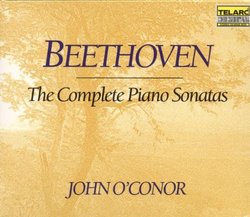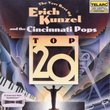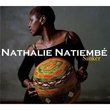| All Artists: Ludwig van Beethoven, John O'Conor Title: Beethoven: The Complete Piano Sonatas (Box Set) Members Wishing: 0 Total Copies: 0 Label: Telarc Release Date: 10/25/1994 Album Type: Box set Genre: Classical Styles: Forms & Genres, Sonatas, Historical Periods, Classical (c.1770-1830), Romantic (c.1820-1910) Number of Discs: 9 SwapaCD Credits: 9 UPC: 089408040023 |
Search - Ludwig van Beethoven, John O'Conor :: Beethoven: The Complete Piano Sonatas (Box Set)
 | Ludwig van Beethoven, John O'Conor Beethoven: The Complete Piano Sonatas (Box Set) Genre: Classical
John O'Conor's complete set of Beethoven piano sonatas is a monumental achievement, not only for the sheer volume of music recorded, but for its coherent interpretive scope and its successful illumination of developmental ... more » |
Larger Image |
CD DetailsSynopsis
Amazon.com John O'Conor's complete set of Beethoven piano sonatas is a monumental achievement, not only for the sheer volume of music recorded, but for its coherent interpretive scope and its successful illumination of developmental aspects of Beethoven's ever-evolving style. The sound, too, is a revelation, perfectly capturing O'Conor's Hamburg Steinway in the ideal acoustics of Mechanics Hall in Worcester, Massachusetts. --David Vernier Similar CDs
|
CD ReviewsSublime playing, best in the mid-to-late sonatas. madamemusico | Cincinnati, Ohio USA | 12/13/2000 (5 out of 5 stars) "Though several fine pianists (and Daniel Barenboim) have all taken a stab at the complete piano sonatas of Beethoven, among them Wilhelm Kempff, Alfred Brendel, Claude Frank and Russell Sherman-all of whom had wonderful moments in their sets-the only two pianists who have truly captured the Beethovian magic throughout their cycles were Artur Schnabel and John O'Conor, for completely opposite reasons. Schnabel was probably the only pianist of his era who played the piano in a manner reminiscent of Glenn Gould. He preferred an instrument with a lean tone, used the sustain pedal very rarely, and worked very hard to bring out inner voices, counterpoint, fugues and canons. He played all of the fast movements at Beethoven's written tempi, even when his flawed technique was not up to the task (the worst example being the first movement of the "Hammerklavier"), and all of the slow movements slower than written. In many of these he was able to bring out a "spiritual" quality that went straight to the heart of those Beethoven-lovers who saw his music in this vein. Yet in relistening to his complete set, modern ears hear more problems in the later sonatas (22-32) than our forebears probably heard: inaccurate playing of syncopated rhythms, for example in Sonata No. 29, and sometimes clumsy handling of some of those slow movements (i.e., the first movement of Sonata No. 12). In many other sonatas, however-including the Op. 49 pair, which were, after all, very early sonatas simply published in the middle of the series-his approach was nonpareil and still remains an object-lesson for aspiring Beethoven pianists. O'Conor, by contrast, uses a rich-toned Steinway, is a master technician and a master of pedal effects. His Beethoven does not always follow the written dynamic contrasts, especially in most of the early sonatas (1-11), because, as he told me, "the fortepianos of Beethoven's time were incapable of them." Historically accurate, but not necessarily the composer's intentions. We know that he was delighted when more powerful pianos appeared, shortly before he lost his hearing for good (around 1805), and that he stated to friends that he thought of all his sonatas being played on that kind of instrument. Yet, paradoxically, O'Conor's more legato phrasing and singing tone often brings out the very best in Beethoven, particularly in sonatas 22-32 but also in numbers 12, 14 ("Moonlight") and 16, where he scores many points in continuity over Schnabel. Moreover, he, too, brings out many of the inner voices whenever contrapuntal effects are called for, and combined with his sterling technique and "binding" of phrases, this can create a mesmerizing effect. I therefore feel that the best of both pianist's sets can combine to make a very satisfying set of the 32 sonatas. Your choice between them will, of course, be a matter of personal taste, but I can assure you that EMI's remastering of the Schnabel recordings is nothing less than miraculous. Only rarely does one hear even the merest swish of the old 78-rpm records. They are noiseless, bringing out the very finest nuance of Schnabel's playing. And the O'Conor set is, of course, digital, though I find that boosting the treble is sometimes necessary as Telarc has always tended to prefer somewhat dull sound. " The definitive complete sonata set madamemusico | 03/04/2002 (5 out of 5 stars) "It was about a year ago when I was reading reviews, much as you are doing now, trying to find the best complete set of Beethoven sonatas. I wanted the entire set from one performer, not a hodge-podge collection from various artists. So I wanted to make sure that I bought the best performance. As it turns out, John O'Conor was the only pianist with consistently good reviews. I bought this set, and have not been dissappointed.At first I was trying to compare the quality to the set of Mozart sonatas by Andras Schiff that I own, but quickly became aware that these sonatas are something different entirely. John O'Conor plays these sonatas (especially the latter ones) with just the right amount of passion, emotion, and force. He is more than up to the task technically, which becomes evident very quickly. His strokes are clean and distinct. The recordings are also second to none. They are simply outstanding. There is no backgroup fuzz or sound inconsistencies of any kind. All you hear is the beautiful piano as if it were played in some kind of vacuum. Its not like the set of Beethoven piano concertoes that I own where I swear I can hear people talking in the background, and hear the performer breathing, turning sheet music, or other oddities. A truly excellent recording job.I have heard various interpretations of these sonatas by various performers, and I compare all of them to John O'Conor's performances. For one reason or another, every sonata in this set seems to have something more, an extra "umph" that sets it apart from other performances. This, I feel, becomes apparent to even the novice listener. Just listen to the "Waldstein", "Tempest" or "Hammerklavier" and you will understand for yourself. They are truly inspired performances. I can't stop thinking that this is how Beethoven would have played his pieces if he were here today. Mr. O'Conor is a tribute to his profession and this is THE definitive set of Beethoven sonatas. The resonable price doesn't hurt either! I would recommend this set to anyone." May it never leave the catalog ... Daniel J. Rose | Shrewsbury, MA USA | 12/10/2001 (5 out of 5 stars) "This is deceptively simple playing, and simply breathtaking. I first heard Mr. O'conor on my car radio playing the Sonata #2 and could not believe my ears. I think I either sat in the parking lot or pulled over to be sure I did not miss the name of the performer.I had been mostly "away" from music for a number of years. Back then, my favorite pianists for most everything were Sviatislav Richter and Aldo Ciccolini, and more recently, Konstantin Lifschitz. Certainly, Richter has left us one of the all-time performances of the "Appassionata," but I was totally unprepared for John O'Conor's unassuming brilliance and generosity of spirit when I first heard it. From the reviewer in Ithaca, it is now clear to me that his approach to Beethoven is a completely honest reflection of his own personality, which must be a gift to all who know him.Most other reviewers have amply described what I can only call a remarkable slight of hand in his playing of these pieces, probably something that one can only hear in a chamber or solo setting that is as closely miked as this one. Of course, his pure and full tone comes, in part, from the remarkable Hamburg Steinway that he plays throughout, and that notably takes prominent credit on every disc. But, as any one who has tried and failed knows, even on the best of pianos the result can only match the skill of the performer, and in Mr. O'conor, this piano merely amplifies his already infinitely sensitive touch. Combined with impeccable precision and a flexibility of tempo that never loses the meter, he gives us a kind of relaxed intensitiy that never takes itself too seriously, yet never wavers in its fidelity of purpose.Mr. O'Conor manages, in every bar, to strike the crystal with perfection and back away from its endless song. In short, he opens Beethoven for all but the dullest ear to see. Thus, I can only hope that this recording of the complete Beethoven sonata cycle never leaves the catalog and generously rewards Mr. O'Conor, as it does us, into a long and fulfilling life."
|

 Track Listings (9) - Disc #1
Track Listings (9) - Disc #1


